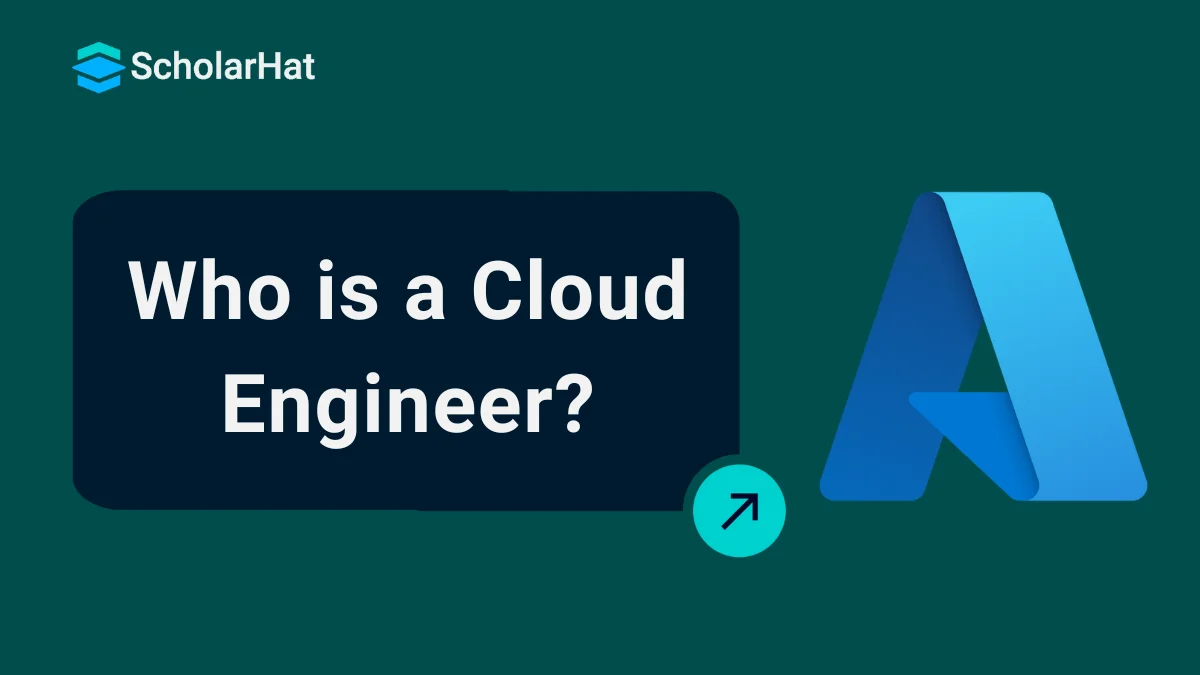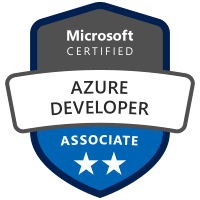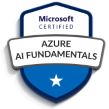15
JanCloud Engineer Roadmap 2025: Role, Skills, and Salary
Who is a Cloud Engineer?
A Cloud Engineer is an IT expert who handles the design, implementation, and upkeep of a company's cloud infrastructure. They collaborate with cloud service providers such, as AWS, Azure, and Google Cloud to guarantee cloud operations that improve scalability, effectiveness, and security.
So In this Azure tutorial, we will see a Cloud Engineer Roadmap including Roles of Cloud Engineer, Skills of Cloud Engineer, and Salary of Cloud Engineer, as well as many other things required to become a Cloud Engineer. 65% of cloud-related jobs will require Azure Fundamentals knowledge. Start your journey with our Free Azure Fundamentals Course today!
What Does a Cloud Engineer Do?
- Cloud engineers are responsible, for transferring an organization's computing operations to the cloud.
- And overseeing the cloud infrastructure.
- Their duties involve implementing and supervising cloud applications.
- Also, they shift applications to the cloud and have to resolve issues, with cloud services.
Roles and Responsibilities of a Cloud Engineer
- Designing Cloud Infrastructure: Crafting secure and dependable cloud setups.
- Deploying and Managing Applications: Utilizing cloud platforms, for application deployment, monitoring, and management.
- Security Management: Enforcing security protocols to safeguard data and applications, in the cloud.
- Performance Monitoring: Consistently overseeing the performance of cloud systems and applications.
- Troubleshooting and Support: Resolving challenges concerning cloud infrastructure.
- Cost Management: Streamlining cloud expenses and Seeking cost solutions.
- Automation: Enhancing efficiency by automating tasks through tools and scripts.
Skills Required to Become a Cloud Engineer
1. Expertise in Cloud Platforms
Understanding of:
- AWS
- Azure
- Google Cloud services.
2. Networking Skills
Knowledge of:
- network IP addressing
- DNS setups
- VPN configurations
3. Security
Familiarity with:
- Security Protocols
- Encryption methods
- Access control measures.
4. Programming Proficiency
Skilled in languages such as:
5. Understanding DevOps
Knowledgeable about DevOps methodologies and tools such as:
- Jenkins
- Docker
- Kubernetes.
6. Database Administration Experience
Hands-on experience with cloud-based database systems, like:
- Amazon RDS
- Azure SQL Database
- Google Cloud Spanner
Educational Criteria and Certifications
1. Educational Criteria
| Degree |
| A bachelor's degree in Computer Science, Information Technology, or a related field. |
2. Certifications
| No. | Various Certifications |
| 1 | AWS Certified Solutions Architect |
| 2 | Microsoft Certified: Azure Solutions Architect Expert |
| 3 | Google Professional Cloud Architect |
| 4 | CompTIA Cloud+ |
Learning Path for Aspiring Cloud Engineers
Let's see step-by-step information about how to become a Cloud Engineer:
1. Earn a Bachelor’s Degree ( Computer Science or IT)
- Having a bachelor's degree in computer science or IT gives freshers a core understanding of computer science fundamentals, which helps them become better cloud engineers.
- Computer degrees cover various topics such as databases, programming languages, networking, and operating systems, which are important for understanding cloud computing.
- Many organizations do not allow individuals without relevant degrees to appear for the job selection process.
- That's why, earning a relevant degree is helpful in the job search.
2. Learn Cloud Basics
- The first thing as an aspiring cloud engineer, you should do is understand the basics of Cloud Computing.
- Learn important topics such as Infrastructure as a Service (IaaS), Platform as a Service (PaaS), and Software as a Service (SaaS).
- Read and learn more about and understand big cloud companies such as Amazon Web Services (AWS), Microsoft Azure, and Google Cloud Platform (GCP).
| What is Cloud Computing? A Beginner’s Guide to Microsoft Azure |
3. Programming
- Becoming skilled, in programming in languages such as Python is crucial.
- Mastering programming allows you to streamline tasks an aspect of handling cloud operations.
- Python stands out for its adaptability, readability, and syntax that closely resembles English making it an ideal option, for crafting scripts that automate cloud-related processes.
- Programming languages offer a toolkit of commands that simplify and expedite cloud management tasks.
| Python Programming for Beginners |
4. Master in Cloud Platform
- Choose a cloud platform such, as AWS, Azure, or Google Cloud Platform (GCP).
- Thoroughly comprehend all the services it offers.
- Focusing on mastering one platform enables you to cultivate skills that set you apart and enhance your marketability, for employment opportunities.
- Familiarize yourself with the array of capabilities it provides for computing, data storage, database utilization, and other functionalities.
5. Earn Cloud Certifications
- You can showcase your tech skills and enhance your credibility in the tech community by earning certifications in cloud computing.
- For that, you have to learn recognized qualifications such as AWS Certified Solutions Architect or Microsoft Certified.
- Azure Solutions Architects are highly respected in the tech community.
- These certifications act as badges that speak about your expertise in the tech world.
- They not only showcase your expertise but also open doors to exciting career opportunities.
- Employers often look for these certifications because they know certified individuals have the right skills for the job.
6. Learn About Cloud Services
- You can learn cloud services by gaining insights, into cloud technologies such as computing, storage, databases (structured data storage) and networking (linking computers).
- Once you grasp the functionalities of these services you can design tailored solutions for businesses.
- This hands-on comprehension forms the basis, for developing and configuring customized cloud solutions.
- Understanding how these components interact enables us to construct adaptable systems.
7. Infrastructure as Code (IaC)
- To have a grasp of infrastructure, as code (IaC) tools such as Terraform or AWS CloudFormation is crucial.
- These tools utilize code to configure and organize resources ensuring consistency and repeatability.
- IaC simplifies the deployment of computing setups in the cloud.
- For cloud engineers, scalability is a factor. IaC enables effortless scaling of infrastructure by making adjustments, to the code.
- Whether managing large setups IaC offers the flexibility to modify your infrastructure according to evolving requirements.
8. Understand DevOps
- To grasp the fundamentals of DevOps pay attention to the implementation of code.
- Also understand fostering collaboration, between development and operations teams.
- DevOps plays a role in managing scalable computing infrastructures in the cloud.
- Understanding these principles facilitates flexible software development and enhancement processes.
| Azure DevOps Course |
9. Hands-On Project Experience
- Working on projects can offer an opportunity for, up-and-coming cloud engineers to translate their understanding into tangible innovations.
- Throughout the project development process, individuals encounter obstacles that help refine their problem-solving abilities.
- Integrating cloud-focused projects into your portfolio allows you to exhibit your proficiency and hands-on involvement. T
- his collection of work serves as a resource, during job searches illustrating your capacity to tackle cloud-related hurdles.
10. Gain Practical Experience in Industry through Internships
- Internships offer experience that enables you to put your knowledge into practice in a professional business environment.
- Being part of a setting gives you the chance to gain insight into the daily workings of cloud engineering.
- Moreover, it allows you to connect with professionals, in the cloud industry who can offer guidance and support.
11. Build your Resume and Apply for Cloud Engineering Jobs
- Create a detailed resume that shows your skills and education in cloud technologies.
- Customize it to highlight experiences that matter.
- Apply for cloud engineering jobs, focusing on your passion for the field, practical projects, and internships.
- Being proactive like this improves your chances of getting a cloud engineering role.
Cloud Engineers Tools and Technologies
1. Popular Cloud Platforms
- AWS
- Microsoft Azure Google Cloud Platform
2. Automation Tools Used
- Terraform
- Ansible
- Chef
3. Containerization Technologies
- Docker
- Kubernetes
| Docker and Kubernetes Course |
4. Continuous Integration/Continuous Deployment Tools
- Jenkins
- GitLab CI/CD
5. Monitoring Solutions
- Prometheus
- Grafana
- CloudWatch
6. Security Measures
- IAM
- AWS Shield
- Azure Security Center
Salary Prospects for Cloud Engineers
Average Pay for a Cloud Engineer
The expected annual salary, for a Cloud Engineer in India is around ₹7,55,000, with an income of about ₹6,55,000. This figure signifies the value derived from our Total Pay Estimate model and is calculated based on salary data provided by our users.
Career Progression and Growth Opportunities
Cloud engineering presents avenues for career growth such as;
- Cloud Architect: For designing and implementing cloud solutions.
- DevOps Engineer: Concentrating on integration and deployment strategies.
- Cloud Security Engineer: Focused on enhancing security practices and ensuring compliance.
- Site Reliability Engineer (SRE): Ensuring the reliability and scalability of cloud systems.
Challenges in the Cloud Engineering Field
1. Adapting to Rapid Changes
- The landscape of cloud technology is ever-changing.
- It's essential to engage in learning to keep abreast of the trends and advancements.
2. Managing Complexity
- Dealing with the intricacies of cloud systems can be quite challenging.
- So It is important to master tools and techniques that simplify the management process.
3. Emphasizing Security
- Ensuring strong security measures, in cloud environments remains a hurdle.
- Prioritizing security across all facets of cloud engineering is paramount.
| Success Tips | |
| Lifelong Learning | Engage in education by taking courses obtaining certifications and gaining hands-on experience. |
| Networking | Connect with cloud engineering communities and participate in industry events and conferences. |
| Hands-On Practice | Develop projects and contribute to open-source initiatives to enhance practical skills. |
Conclusion
Choosing a career as a cloud engineer in 2025 promises prospects with room for growth and advancement. By following this roadmap honing skills and committing to learning aspiring cloud engineers can lead your way toward success, in this vibrant and high-demand field.
The tech industry is shifting, 70% of developers without cloud skills will struggle by 2026. Join our Microsoft Azure Developer Certification course now!
FAQs
Take our Azure skill challenge to evaluate yourself!

In less than 5 minutes, with our skill challenge, you can identify your knowledge gaps and strengths in a given skill.









